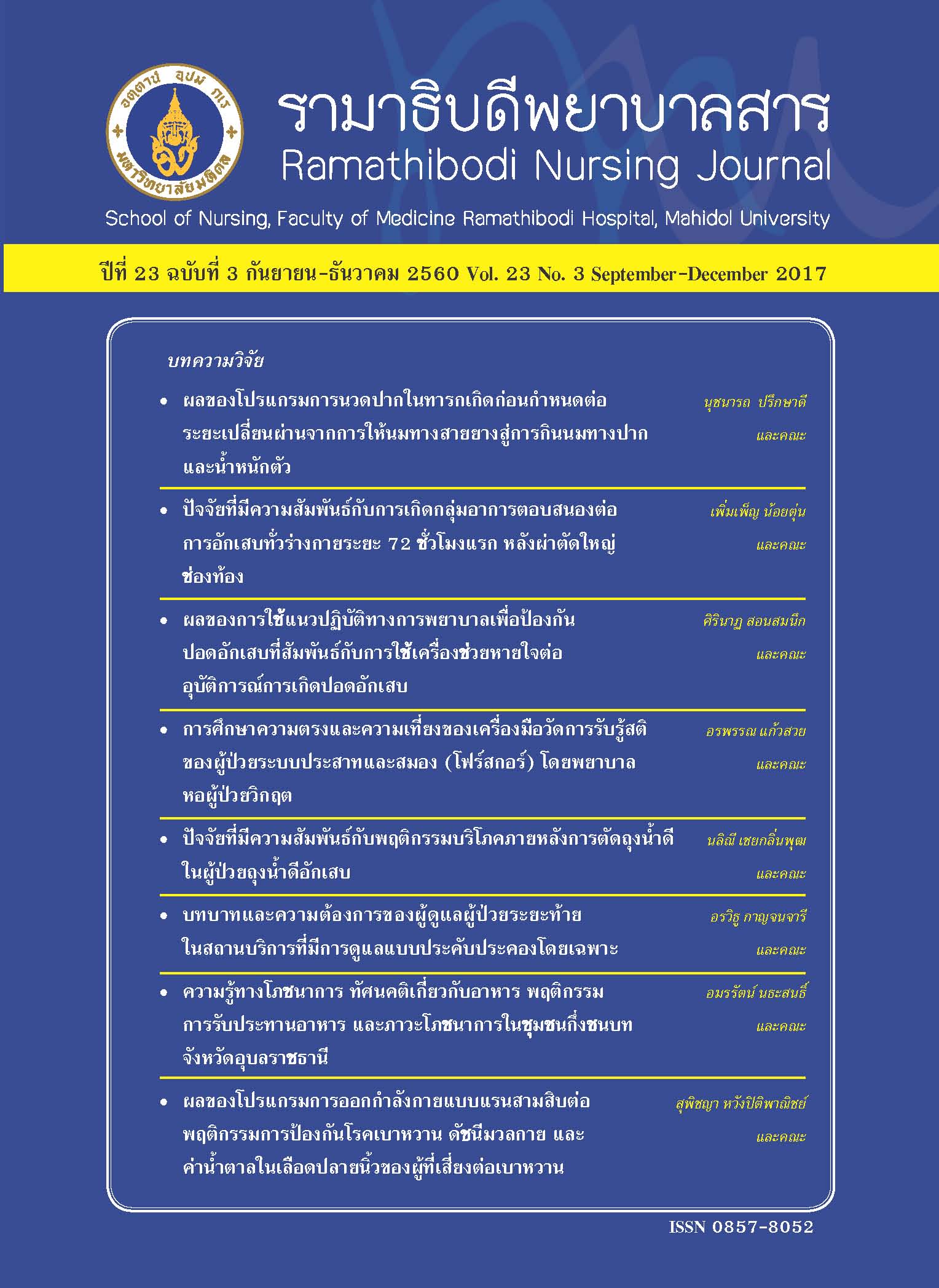Nutritional knowledge, attitude toward food, food consumption behavior, and nutritional status in semi-rural community, Ubon Ratchathani province
Main Article Content
Abstract
Abstract:
This survey research aimed to describe nutritional knowledge, attitude toward food, food consumption behavior and nutritional status, and to examine the associations between these factors among community dwellers. The sample included 200 community dwellers living in Warin Chamrap District, Ubon Ratchathani Province. Data were collected using self-reported questionnaires and nutritional assessment. Data were analyzed using descriptive statistics and Spearman,s correlation coefficient. Results revealed that average scores as calculated by mean percent for nutritional knowledge, attitude toward food, and food consumption behavior were 59.16%, 66.83%, and 62.77%, respectively. The sample had less mean score percentage of nutritional knowledge, attitude toward food, and food consumption behavior, particularly for dietary fat intake, as compared to other food intakes. Regarding nutritional status, 43 % of the sample had normal body mass index (BMI), while, 22.50%, 13 %, and 7.50% of them were overweight, obesity, and underweight, respectively. However, the average of BMI (22.18±2.76 kg/m2) and waist circumference (78.01±7.86 cm.) were normal. The majority of the sample (81.50%) had abnormal waist hip ratio with average of 0.87±.05. Significant negative correlations were found between food consumption behavior and BMI. Age had a positively significant correlation with food consumption behavior. Education level had a positively significant relation to nutritional knowledge and family income. Results in this study should be used as information for developing a nutritional health promotion program related to nutrition knowledge, and promoting appropriate food consumption behaviors to improve nutritional status of this population.
Keywords: Nutritional knowledge, Attitude toward food, Food consumption behavior, Nutritional status, Semi rural community
Article Details
บทความ ข้อมูล เนื้อหา รูปภาพ ฯลฯ ที่ได้รับการตีพิมพ์ในรามาธิบดีพยาบาลสาร ถือเป็นลิขสิทธิ์ของวารสาร หากบุคคลหรือหน่วยงานใดต้องการนำทั้งหมดหรือส่วนหนึ่งส่วนใดไปเผยแพร่หรือเพื่อกระทำการใด ใด จะต้องได้รับอนุญาตเป็นลายลักษณ์อักษรจากรามาธิบดีพยาบาลสารก่อนเท่านั้น
References
2. Natason A, Sehaphan N, Pinthong P. The effect of health information media toward nutritional knowledge, attitude toward food, food behavior, and nutritional status in semi-rural community.Full text 2013.UbonRatchathani. (in Thai)
3. Piaseu N, Tatsanachantatanee D, Kittipoom S, Putwatana P. Nutrition knowledge, attitude toward food, food behavior, and nutrition status among nursing students. Rama Nurs J. 2009;15(1):48-59.(in Thai)
4. MusikthongJ, Sriyuktasuth A, Kongkar R, Sangwichaipat N. Nutrition knowledge, attitude toward food, food consumption behavior, and nutrition status in nursing students, Mahidol University. J Nurs Sci. 2009;28(3):41-9. (in Thai)
5. Chapha M. Nutritional knowledge, attitude toward food, food consumption behavior, and nutritional status in Air Force student nurses. Journal of the Police Nurse. 2014; 6(2):144-57. (in Thai)
6. Mullaney MI, Corish CA, Loxley A. Exploring the nutrition and lifestyle knowledge, attitudes, and behavior of student home economics teachers: baseline finding -from a 4-years longitudinal study.Int J Consum Stud.2008;32:314-22.
7. Nilmanat K, Naka K, Kong-in W, Sai-jew A, Chailungka P, Boonphadh P. Nutritional conditions of elderly people in the three Southernmost border provinces. Thai J Nurs. 2013;28: 75-84. (in Thai)
8. Chumkaew K, Rungsayatorn S. Knowledge, attitude, and food consumption behavior of the elderly in Songkhla province.Kasetsart Journal of Social Sciences. 2014;35(1): 16-29. (in Thai)
9. Saleepan S, Sinawat S, Damapong S. Dietary intake of Thais in the fifth National Nutrition Survey of Thailand.Journal of the Nutrition Association of Thailand. 2009;44(3):91-101. (in Thai)
10. Suparp S. Social and cultural Thailand: family values, religious traditions. Bangkok: Thai Watana Panich; 2000. (in Thai)
11. Murray RB, Zentner PJ. Nursing assessment and health promotion: Strategies through the life span. (5thed.). Norwalk: CT: Appleton & Lange; 1993.
12. Polit DF, Beck CT. Nursing research: principle and methods. (9thed.). Philadelphia: J.B. Lippincott; 2012.
13. Choo V.WHO reassesses appropriate body-mass index for Asian populations. The Lancet. 2002;360:235.
14. World Health Organization. Physical status: The use and interpretation of anthropometry. Technical Report Series, 854.Geneva, Switzerland: World Health Organization; 1995.
15. Ferketich S. Focus on psychometrics internal consistency estimates of reliability. Res Nurs Health. 1990;13: 437-40.
16. Tanaree W. Food choice behavior of the people in Saluang-Keeleake, Mae Rim district, Chiang Mai province.Full text 2012. Chiang Mai. (in Thai)
17. Pender NJ. Health promotion in nursing practice. (3rded.). New York: Appleton & Lange; 1996.
18. Polsiri A. Knowledge, attitudes, and behaviors about food consumption of Ramkhamhaeng University undergraduate students.Ramkhamhaeng Research Journal of Humanities and Social Science. 2008;11(1):49-60. (in Thai)
19. Lutz CA, Mazur EE, Litch NA. Nutrition and diet therapy. Philadelphia: F.A. Davis; 2015.


